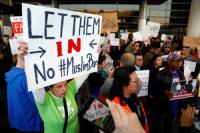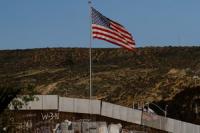-
Border agents should obtain a warrant to search travelers’ phones, EFF tells court
Border agents must obtain a warrant to search travelers’ phones, tablets, and laptops, which contain a vast trove of sensitive, highly personal information that is protected by the Fourth Amendment, the Electronic Frontier Foundation (EFF) told a federal appeals court the other day. The EFF says that searches of devices at the border have more than doubled since the inauguration of President Trump — from nearly 25,000 in all of 2016, to 5,000 in February alone. This increase, along with the increasing number of people who carry these devices when they travel, has heightened awareness of the need for stronger privacy rights while crossing the U.S. border.
-
-
U.S. crime rates declined in period of high immigration: Reports
The number of immigrants in the United States has risen from 3.5 million in 1990 to 11.1 million in 2014, but two new studies show that an increased number of immigrants in the country might have been associated with a historic decline in crime rates. The studies – Immigration and Public Safety from the Sentencing Project and Criminal Immigrants Their Numbers, Demographics, and Countries of Origin from the CATO Institute — also shows that immigrants are less likely than U.S.-born citizens to commit crimes and be imprisoned.
-
-
Two government reports do not strengthen case for travel ban
Two internal government reports appear to weaken the case the Trump administration has been making for the temporary travel ban. The implementation of the second version of the ban has been halted by judges in Hawaii and Maryland. The first report, prepared by DHS, found that most of the suspected or confirmed foreign-born terrorists probably became radicalized after they arrived in the United States, not before. The second report, based on data collected by the FBI, shows that most of the suspected or confirmed foreign-born terrorists had come from countries not among the six countries to which the travel ban would apply. The data in the two reports “points to the central question about the travel ban, which is, are you addressing the issues you need to address when it comes to the threat?” says one expert.
-
-
Immigration bans tend to create unintended consequences

Research of various measures to restrict immigration — a policy response common for countries that have experienced terrorist attacks in the past — has pointed to unintended long-term consequences of similar controls on immigration. “Some recent research shows that umbrella restrictions on migration control can backfire,” says one researcher. “Instead of mitigating radicalization, these restrictions tend to have blowback effects. Insofar as the ban against a set of states is an umbrella ban, it’s likely to have the same unintended negative effects.”
-
-
New guide helps travelers protect their digital information at the border
Increasingly frequent and invasive searches at the U.S. border have raised questions for those who want to protect the private data on their computers, phones, and other digital devices. A new guide released last week by the Electronic Frontier Foundation (EFF) gives travelers the facts they need in order to prepare for border crossings while protecting their digital information.
-
-
Homeland Security notes sharp drop in illegal crossings in February
The Department of Homeland Security said there was an unprecedented drop in illegal crossings at the country’s Southwest border since the president took office 20 January. The number of apprehensions fell about 40 percent from January to February, according to DHS statistics released Wednesday evening.
-
-
U.S.-Mexico borderland communities are resilient: Researcher
A British academic who has extensively studied communities on the borderlands between the United States and Mexico, says these communities’ strong cross-border cultural identity and economic ties make them undaunted by the possibility of a physical wall.
-
-
Trump’s revised travel ban still faces legal challenges
President Trump’s new executive order on immigration addresses some of the legal problems found by courts in the Jan. 27 original order, but is still vulnerable on some of the same legal grounds. As a constitutional law professor who has recently written on this topic, I’d contend that Trump’s lawyers are not out of the woods yet. Ultimately, the only way to know for sure the legal effect of this new executive order is to wait for a court ruling. Given that the American Civil Liberties Union has already pledged to challenge the new executive order in its ongoing litigation against the immigrant ban, we may not have to wait long.
-
-
Revised ban excludes Iraq, current visa holders; no priority to religious minorities
President Donald Trump has signed a revised travel ban which will go into effect on 16 March. The revised executive order will halt entry to the United States for ninety days for people from six Muslim-majority nations who are seeking new visas. Iraq has been removed from the list of travel ban countries, and Syrian refugees will now be treated as other refugees. Religious minorities will not be given preferential treatment.
-
-
Scientists say Trump's border wall would devastate wildlife habitat
There’s been a lot of debate about how effective the Bush-era border barrier has been at keeping out illegal crossers and drug smugglers. Some data indicates the barriers have encouraged people to cross in places where there isn’t one, and handprints on the existing border wall show that a determined person can still easily scale it. What the border fence has kept out instead, according to environmentalists, scientists, and local officials, is wildlife. Experts say that if President Donald Trump makes good on his promise to turn the border fence into a continuous, 40-foot concrete wall, the situation for wildlife along the border — one of the most biodiverse areas in North America — will only get worse. A mix of vehicle barriers and pedestrian fencing currently covers only about one-third of the nearly 2,000-mile U.S.-Mexico border – but even with all those gaps, the barriers have made it harder for animals to find food, water, and mates. Many of them are already endangered.
-
-
DHS has found only $20 million of the $21 billion needed for border wall

President Donald Trump’s pledge to use existing funds to launch the construction of a wall on the U.S.-Mexico border has run into an obstacle: There is only little money available to start the project. DHS has identified only $20 million that can be reallocated to the $21 billion project. DHS searched for available funds only within its $376 million budget for border security fencing, infrastructure and technology. Redirecting funds from other departmental accounts would require congressional approval. The funds currently available would cover 0.1 percent of the project’s cost — or pay to build 2.5 miles of border barrier.
-
-
Recent raids drive immigrant families to passport scramble
Two weeks ago, ICE arrested dozens of undocumented immigrants across the nation in what they said was a routine action. But the immigrant community was already on edge because of rising anti-immigrant rhetoric during the presidential campaign, and the ICE actions sent many undocumented families into a panic. Fearing deportation, immigrant families are crowding passport lines across Texas as undocumented parents seek U.S. passports for their American children.
-
-
Why mass deportations are costly and hurt the economy
President Donald Trump has pledged to deport several million undocumented immigrants and recently set a plan in motion targeting those with criminal records (of any kind). While the ethical issues with mass deportations have received lots of attention, the economics haven’t been explored as comprehensively. And the costs of mass deportations will likely be significant. Deportation-related economicfactors mean that the government must think carefully before aggressively pursuing undocumented immigrants. There are significant costs associated with deportations and the government should consider them carefully when weighing its policy objectives.
-
-
Mexico, rejecting Trump’s scheme, will only accept deportees who are Mexican nationals
A key element in President Trump’s deportation scheme is the deportation to Mexico of everyone crossing the U.S.-Mexico border illegally, regardless of the deportee’s nationality. The deportation scheme indicates that the United States expects Mexico to build detention facilities for the hundreds of thousands which will be deported. Mexican officials, in meetings with Rex Tillerson and John Kelly last Thursday, said that Mexico would not, under any circumstances, agree to accept and hold deportees who are not Mexican nationals.
-
-
Turkey completes half of its Syrian border wall
Turkey has completed more than half of a planned 317-mile wall along its border with Syria. The wall is not built as a regular wall would: It consists of portable concrete blocks, each weighing seven tons, placed next to each other. The concrete blocks are 6.5-foot thick at the base and 10-foot high. Each block is topped with three feet of razor wire. The government says the wall will improve security, but human rights groups warn refugees fleeing war will be tapped on the Syrian side.
-
- All
- Regional
- Water
- Biometrics
- Borders/Immig
- Business
- Cybersecurity
- Detection
- Disasters
- Government
- Infrastructure
- International
- Public health
- Public Safety
- Communication interoperabillity
- Emergency services
- Emergency medical services
- Fire
- First response
- IEDs
- Law Enforcement
- Law Enforcement Technology
- Military technology
- Nonlethal weapons
- Nuclear weapons
- Personal protection equipment
- Police
- Notification /alert systems
- Situational awareness
- Weapons systems
- Sci-Tech
- Sector Reports
- Surveillance
- Transportation
Advertising & Marketing: advertise@newswirepubs.com
Editorial: editor@newswirepubs.com
General: info@newswirepubs.com
2010-2011 © News Wire Publications, LLC News Wire Publications, LLC
220 Old Country Road | Suite 200 | Mineola | New York | 11501
Permissions and Policies
Editorial: editor@newswirepubs.com
General: info@newswirepubs.com
2010-2011 © News Wire Publications, LLC News Wire Publications, LLC
220 Old Country Road | Suite 200 | Mineola | New York | 11501
Permissions and Policies
